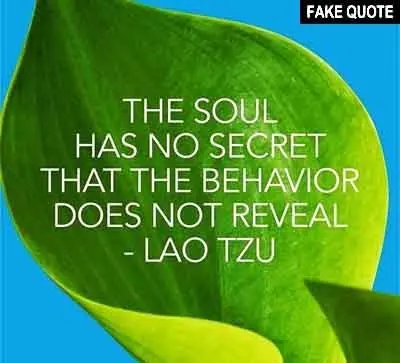|
Tao Te Ching
THE TAOISM OF LAO TZU
|
Fake Lao Tzu Quote"The soul has no secret..."
This is NOT a quote from Tao Te Ching:"The soul has no secret that the behavior does not reveal."
The soul as we see it is not a concept with which Lao Tzu would be familiar. When we speak of the soul, we incorporate ideas of a Christian tradition, suggesting among other things something separate from the body — maybe even surviving it. Lao Tzu did not express a belief in an afterlife or anything in man separable from his body. Well, we use 'soul' for so many different things relating to the human mind and awareness. So, it is possible to use it, carefully, in the translation of an ancient Chinese text. I have done so in my version of Tao Te Ching, at the start of Chapter 10:
The same goes for behavior. This broad term could also be used, though carefully, in a translation of Lao Tzu's Tao Te Ching. Still, the main problem with this fake Lao Tzu quote is that it points to the psyche of an individual personality, which is far from how Lao Tzu regarded mankind. It's a modern view of the mind as something internal, hidden from the minds of others and using this secrecy to get ahead. To Lao Tzu, human beings were basically the same, and so was their mentality. Some got wiser and thereby acted nobly, in accordance with Tao, the Way. The others were driven by basic needs and urges that were far from secret. The idea that anyone would try to hide and even fake his personality was alien to Lao Tzu. He did not even say something that suggested people have personalities different from those of others. To him, we are all pretty much the same. The differences are in what we understand, not what we strive to be. He did see actions, which can be translated to behavior, as what revealed the wisdom acquired. The wise would act according to their wisdom, as would the unwise according to their lack of it. Pretense had nothing to do with it, since they could do nothing else. I haven't found a Tao Te Ching version containing the quote examined here. Nor did I find it in a Google book search. It seems to have appeared on the Internet. A Facebook search finds the first appearance of the fake quote on October 17, 2013, giving neither Lao Tzu nor anyone else as the source. It didn't reappear on Facebook until 2016, where it got accredited to Lao Tzu. There is, though, a similar quote:
The French wording can be found in Abrégé du Journal de Paris, p. 359, where it is also explained as a Chinese proverb (maxime). The book was printed in Paris 1789 -- a year of revolutionary significance in that city. But the quote is from a 1777 article of the Journal. It is not difficult to see how a Chinese proverb becomes accredited to the most legendary of Chinese philosophers. But Lao Tzu said nothing of the kind.
Stefan Stenudd April 18, 2017, revised September 10, 2020.
More Fake Lao Tzu QuotesThere are many more fake Lao Tzu quotes examined on this website. Click the header to see a list of them.
Fake interview with the authorClick the header to read a "fake" interview with Stefan Stenudd, the author of Fake Lao Tzu Quotes.
About CookiesMy Other Websites:I Ching OnlineThe 64 hexagrams of the Chinese classic I Ching and what they mean in divination. Try it online for free.
Qi Energy ExercisesThe ancient Chinese life energy qi (chi) explained, with simple instructions on how to exercise it.
Life EnergyThe many ancient and modern life force beliefs all over the world explained and compared.
Taoismen på svenska
Other Books by Stefan StenuddClick the image to see the book at Amazon (paid link).
The Greek philosophers and what they thought about cosmology, myth, and the gods. |
 Tao Te Ching
Tao Te Ching Now it's a book, too!
Now it's a book, too! Tao Quotes
Tao Quotes Cosmos of the Ancients
Cosmos of the Ancients Qi — Increase Your Life Energy
Qi — Increase Your Life Energy Aikido Principles
Aikido Principles Life Energy Encyclopedia
Life Energy Encyclopedia Archetypes of Mythology
Archetypes of Mythology Stefan Stenudd
Stefan Stenudd